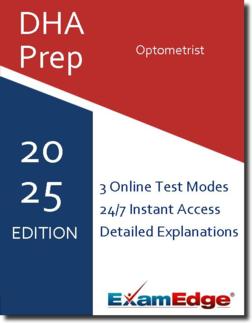DHA Optometrist Practice Tests & Test Prep - Topics
Based on 28 Reviews
- Real Exam Simulation: Timed questions and matching content build comfort for your DHA Optometrist test day.
- Instant, 24/7 Access: Web-based DHA Optometrist practice exams with no software needed.
- Clear Explanations: Step-by-step answers and explanations for your DHA exam to strengthen understanding.
- Boosted Confidence: Reduces anxiety and improves test-taking skills to ace your DHA Optometrist (OPTOM).



